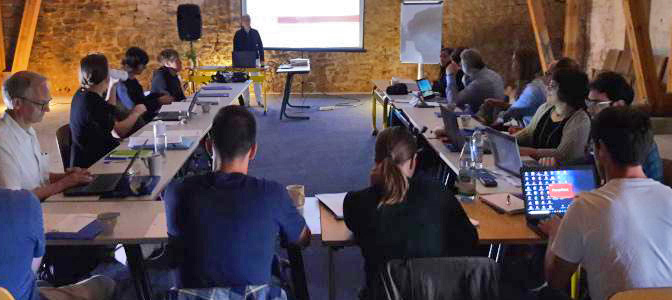Hauptinhalt
Social Entrepreneurship and Social Innovations in European Rural Regions – Recommendations for Policy Makers
International Policy Roundtable

The background of the policy roundtable is the EU-funded project “Social Entrepreneurship in Structurally Weak Rural Regions: Analysing Innovative Troubleshooters in Action RurAction” which started in December 2016 and will be finished at the end of the year.
The project is based on the observation that a downward spiral has been set in motion in many structurally weak rural regions of Europe in the past decades. Particularly, the economic and financial crisis starting in 2007/2008 has become a burden in some European regions. In the past, ever more rural inhabitants were leaving the countryside. A consequence was a deficit in the required labour force and skilled workers, leading to a further deterioration in the economic prospects of such areas. This often makes it difficult to break the downward spiral and reverse its effects. Currently, the Corona pandemic will certainly bring along new challenges.
In the face of such challenges, actors in some parts of the countryside have become active and are taking things into their own hands in order to improve their situation. Several have even founded small companies, creating workplaces and an economic basis for themselves and others. In many instances it is the case that actors leave behind more well-trodden paths and develop novel approaches in the search for solutions. This is what we call social innovations. In some cases, actors have found support among fellow campaigners who have set themselves the goal of promoting innovative problem-solving approaches and, once tried and tested, of professionally supporting creative processes and grass-roots initiatives, as well as business start-ups. The talk is of social entrepreneurs.
Meanwhile policy makers build their hopes on the ‘transformative power’ of socially innovative solutions and social entrepreneurship. The European Commission in particular, aims at empowering people and driving change through social innovations. There are, however, still many questions about the conditions in which social innovation emerges in rural areas, how its potential can be developed, and what support strategies can be used to assist it.
The RurAction project aimed at tackling these questions by empirically analysing innovative initiatives in the countryside and by understanding critical junctures that could pose a threat to their further progress as well as favourable factors that are needed for the creation, implementation and spatial spread of innovative solutions. The findings led to recommendations for action concerning future support and particularly for funding strategies in this field. In the policy roundtable we will discuss these recommendations with policy makers.

